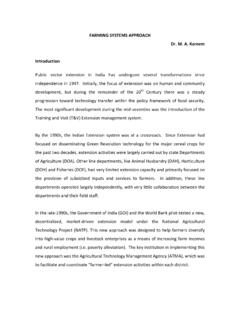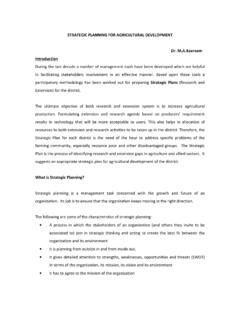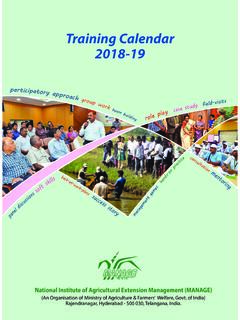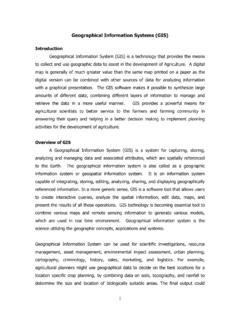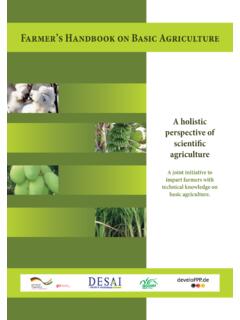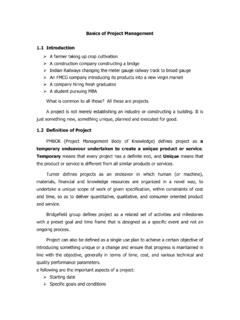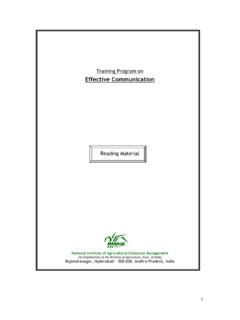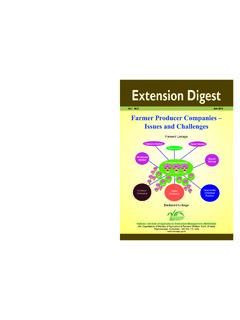Transcription of ‘e-Extension: ICT Applications in Agricultural Extension ...
1 USAID-INDIA-Afghanistan Feed The Future India Triangular Training (FTF ITT) Programme on e- Extension : ICT Applications in Agricultural Extension Management 10th 19th October 2016 Ministry of Agriculture, Irrigation and Livestock (MAIL) Kabul, Islamic Republic of Afghanistan REPORT Dr. V. P Sharma Dr. Lakshmi Murthy Dr. Srinivasacharyulu Attaluri USAID-INDIA-Afghanistan Feed The Future India Triangular Training (FTF ITT) Programme on e- Extension : ICT Applications in Agricultural Extension Management REPORT 2017 Prepared by: Dr. V. P Sharma Dr. Lakshmi Murthy Dr. Srinivasacharyulu Attaluri Typing and Page Layout: Mr.
2 S. Sandeep Sagar CONTENTS Page No. Executive Summary 1 1. Introduction 3 Background 3 Objectives 4 Themes and Coverage 5 Profile of Participants 6 2. Inauguration 7 3. Methodology 9 Training Approach 9 Resource Persons 9 Life Membership to Professional Bodies 10 Back-At-Work-Plans 10 Valedictory Program 10 4. Technical Session 11-14 5. Training Evaluation 15 Pre and Post-Training Test 15 Evaluation of Technical Sessions by Participants 15 6. Road Ahead 16 Annexures Annexure-I : Training Program Schedule Annexure-II : List of Participants Annexure-III: Pre and Post-Training Test Annexure-IV: Participants Feedback Annexure-V : Back-At-Work-Plans 1 EXECUTIVE SUMMARY The Ministry of Agriculture, Irrigation and Livestock (MAIL) recognizes the need for a comprehensive service delivery mechanism in accordance with the needs of the farmers.
3 The importance of Agricultural Extension in providing the relevant information, technology and knowledge to the farmers and creating the enabling environment to increase production and productivity is quite clear, as mandated under the National Agricultural Extension Policy (NAEP). The Extension Service System under the National Agricultural Extension Policy has an indispensable and vital role in providing Extension support to a large population of farmers and herders. The Extension personnel have to be transformed into a vibrant and useful knowledge force to bring about the desired changes in agriculture, animal husbandry and natural resources management.
4 It further reinforces that any attempt to strengthen and enhance the capability of existing Extension functionaries is a welcome step for agriculture development. Similarly, there is a large number of private Extension players like agribusiness companies, farmers' organizations, agri- entrepreneurs , input dealers, NGOs and cooperatives which are complementing, supplementing and also working in partnership with public Extension system at the grassroots level. These private Extension functionaries also need to be empowered through capacity building to improve their effectiveness in the delivery system.
5 Implementation of the Policy calls for comprehensive interventions including the strengthening of the Research- Extension -Education continuum from the laboratory to the field. This includes ICT-mediated Agricultural education platforms such as the use of video technology in community settings to reach out to the farmers, based on lessons learned from countries of the region which have succeeded in transforming agriculture by bringing the field to the farmers. The General Directorate of Extension and Agriculture Development (GDEAD) has been developing many ICT innovations in linking research- Extension -education for agriculture.
6 These include, Farmers Call Centers, Digital Library, Development of ICT Applications and website, Video technology, Post Graduate Diploma program and Extension Service Messages. 2 Realizing the paramount importance of public and private Extension system functionaries, the General Directorate of Extension and Agriculture Development of MAIL arranged a training program under theme of e- Extension : ICT Applications in Agricultural Extension Management in collaboration with The National Institute of Agricultural Extension Management (MANAGE), India, under Feed the Future intervention of USAID on October 10th to 19th, 2016 at MAIL.
7 The main Objective of the training program was Developing an innovative ICT mediated Agricultural Education Knowledge Management Platform for strengthening MAIL s Agricultural Research- Extension -Education Continuum. 3 1. INTRODUCTION Background The Ministry of Agriculture, Irrigation and Livestock (MAIL) recognizes the need for a comprehensive service delivery mechanism in accordance with the needs of the farmers. The importance of Agricultural Extension in providing the relevant information, technology and knowledge to the farmers and creating the enabling environment to increase production and productivity is quite clear, as mandated under the National Agriculture Extension Policy (NAEP).
8 Under this Policy, the division of responsibilities between the public and non-state sectors in the delivery of demand-driven Extension services will shift towards an increased role for the private sector in direct service delivery while the role of the Government will be focused on regulatory matters and quality oversight. The change follows an acceptance by the Government that farmers need to have a direct role in problem solving and they must take ownership of the solutions to these problems. The Extension Service System under the National Agriculture Extension Policy has an indispensable and vital role in providing Extension support to a large population of farmers and herders.
9 The Extension personnel have to be transformed into a vibrant and useful knowledge force to bring about the desired changes in agriculture, animal husbandry and natural resources management. It further reinforces that any attempt to strengthen and enhance the capability of existing Extension functionaries is a welcome step for agriculture development. Similarly, there is a large number of private Extension players like agribusiness companies, farmers' organizations, agri- entrepreneurs , input dealers, NGOs and cooperatives which are complementing, supplementing and also working in partnership with public Extension system at the grassroots level.
10 Implementation of the Policy calls for comprehensive interventions including the strengthening of the Research- Extension -Education continuum from the laboratory to the field. This includes ICT-mediated Agricultural education platforms such as the use of video technology in community settings to reach out to the farmers, based on lessons learned from countries of the region which have succeeded in transforming agriculture by bringing the field to the farmers. 4 MAIL together with its programs and projects can work on building ICT Applications required for disseminating best practices and knowledge generated to the farmers, scientists, graduate students and Extension personnel.
